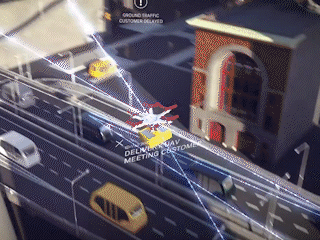
What do you call a Smart City without PNT?
A city.
Most definitions of a Smart City talk about a city that leverages connectivity for the Internet of Things (IOT), transportation, sustainability, and energy usage.
But this technology already exists.
So what is the city of the future really lacking? This:
Self-driving vehicles, flying taxis, and delivery drones can reduce traffic and emissions - and stress for commuters.
But this won't happen without better navigation infrastructure.
Vehicles are already being outfitted with cameras and lidar for proximity sensors.
But this is for spatial awareness to prevent collisions - they don't provide guidance.
GPS and other space-based position, navigation and timing (PNT) systems work well on the open highway, but can’t provide effective navigation in urban canyons, tunnels, and parking garages.
One solution was described in 2008 by Steve Jobs: in large cities, we are surrounded by wi-fi routers and cell towers that are natural beacons.
The next step is to provide position and timing over these beacons as part of a larger mobility network.
But these beacons need to be accurately – and securely – synchronized.
Timing not only impacts the position accuracy, but in a future of flying cars you don’t want infrastructure that can be easily hijacked.
Last Week's Theme: The Server Lights Are Big and Bright
- Check out our Start Engine campaign page to own your own piece of Xairos! You can also check out a summary of our latest Investor Update.
- Planning for upcoming conferences and presentations in March, including a Royal Institute of Navigation Workshop, Satellite 2023, Space Symposium, and a presentation at the Workshop on Synchronization and Timing Systems.
- Working on new proposals, new IP, and the next step in our hardware development.
- Standing up a UK subsidiary to address new business opportunities there and in Europe.
- Foundation for the Future podcast to be released soon, with more interviews and podcasts to be announced soon.
- European leaders approved the IRIS² constellation as an “alternative to Starlink.” A key difference: “Security would be provided through quantum encryption.”
- “While every part of assured position, navigation and timing is critical to future U.S. Army missions, timing often seems to be overlooked,” according the US Army director of the Assured Positioning, Navigation and Timing/Space (APNT/Space) Cross-Functional Team.
- SK Telecom and IDQuantique announced plans to unveil their “Quantum Cryptography One Chip” at Mobile World Congress (MWC) 2023. They are already providing quantum random number generation chips on the latest Samsung flagship phones – but only in Korea.
- Another large solar flare erupted Friday, but, fortunately only glanced the Earth. It still “created temporary radio blackouts on the sunlit side of Earth” and impressive aurora borealis displays. The peak may be over but you can still check out this aurora forecaster.
- The Defense Innovation Unit (DIU) recently noted that the “U.S. military must stop building satellite systems from scratch and better leverage of the commercial space sector by buying commoditized systems and services.”
- This was echoed by the US Space Force: “Traditionally, the military has chosen to build expensive, bespoke solutions," but "there has been an increased emphasis on leveraging commercial systems and services when possible."
- There is also renewed interest in dual-use and defense focused startups among investors like Andreessen Horowitz, who recently hosted the American Dynamism summit geared towards startups taking “on our country’s most pressing issues to support the national interest.”
- In the past, disruptive companies emerged from crises in the tech industry, and there are some that believe that this will happen again and it won’t necessarily come from Silicon Valley.
- Royal Institute of Navigation LEO PNT Workshop, March 1, London
- Workshop on Synchronization and Timing Systems, March 13 - 16, Vancouver, Canada
- Satellite 2023, March 13 - 16, Washington DC
- Space Symposium, April 17 - 20, Colorado Springs, CO
- Commercialising Quantum Global, May 17 - 19, London UK
- Quantum 2.0 Conference, Denver, CO, June 18 - 22
Quantumania isn't just the title of a superhero movie - in the real world there has been a lot of interest in quantum technologies recently.
The incredible applications enabled by quantum technologies has created a sort of global quantum arms race.
By some estimates (including recent McKinsey and Deloitte reports) China was the leader in global quantum funding.
In the US, funding from the National Quantum Initiative Act led to a renewed government focus and new quantum testbeds in Washington DC, Chicago, Tennessee, and New York.
This race is so critical that The World Economic Forum raised concerns about a growing quantum divide, since "quantum technology will exponentially accelerate the Fourth Industrial Revolution."
To learn more, please email us or schedule a meeting here.

